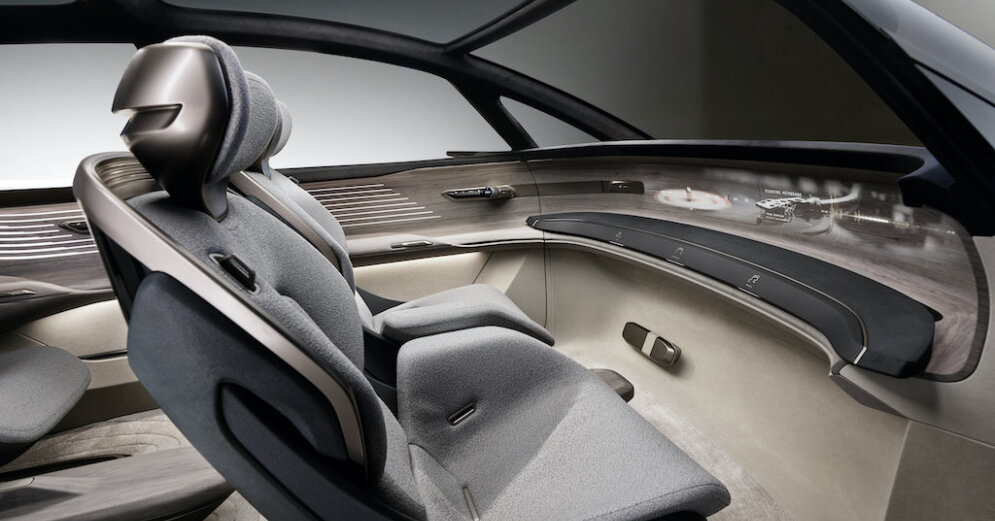Will self-propelled cars soon become a reality on our roads? How should people change attitudes to ensure that autonomous driving becomes a safe part of everyday life? “AudiThe “SocAIty – Autonomous Driving for Social Acceptance” study carried out in collaboration with industry experts from around the world also focused on autonomous driving, and Audi experts explain the most common myths.
–
–
Content will continue after the ad
Advertising
–
Myth 1: Self-propelled cars will be the same as normal, only without drivers
Aerodynamics are one of the most important factors that characterize the range of operation of any car and at the same time influence its design. Although vehicle automation is increasing, the exterior is not experiencing such rapid changes. However, it is clear that in the future, more and more attention will be paid to highlighting your individuality in the interior. Passenger comfort will be a priority, so the seating position can vary more and more, with different driving directions.
Myth 2: Once the software is developed and available, autonomous cars will be able to drive anywhere
Reliable and comprehensive software will enable drivers to participate safely on the road so that self-propelled cars can participate in road traffic. This will gradually change the look of our cities: to achieve this, infrastructure needs to be expanded to include smart traffic lights and road sensors. Cities will become more digital, providing a suitable ecosystem for an increasing number of such cars.
Myth 3: Driving a self-propelled car will not be so interesting
This myth is an obvious source of anxiety for car lovers: they are doomed to the role of inactive passenger. Some fear that their car will not allow them to drive around the country and enjoy the pleasure of having their feet on the pedal and their hands on the steering wheel. But in reality, the opposite is true: the joy we get behind the wheel will not end with the introduction of self-propelled cars into our daily lives. No manufacturer will deny its customers driving on their own. The driver will be able to decide when to entrust the steering to the car, for example during traffic jams.
Myth 4: Self-propelled cars are at risk from hackers
Any vehicle with state-of-the-art technology can be subject to a cyber attack. However, the impact of a hacker attack on self-propelled car security systems can be much more serious. For this reason, manufacturers are constantly developing protection measures against such possible attacks and are constantly improving their protection mechanisms. As cars are increasingly networked with the environment, there is also a growing need for reliable and up-to-date cybersecurity.
Myth 5: Self-propelled cars will need less parking space
Self-propelled cars will not need less parking space, but they will be used much more efficiently. In addition, the density of vehicles in large cities could decrease if an increasing proportion of cars were used as a public service.
Myth 6: Technology already exists, but legislation is still lagging behind
Since 2017, autonomous driving systems have been allowed, under certain conditions, to take over activities for which only a person was previously responsible (autonomous driving level 3). In June 2021, a legal framework was developed that allows Level 4 and higher autonomous vehicles to participate in public transport on a regular basis, but only in certain areas (eg routes A to B). This law is a first step towards a more comprehensive framework, which is currently being worked on intensively. Consequently: law enforcement does not block development. They simply follow the legal principle that safety comes first.
Myth 7: In emergencies, vehicles will have to make vital decisions
In terms of autonomous driving, the decisive factor from today’s point of view is that the decision is not made by the car itself, but by the people who program the vehicle. The car can only operate as specified by the software. All previous studies show that cars are significantly less prone to human error than humans, for example because of their immunity to fatigue, even during long journeys.
Experts explain that a self-propelled car will not make its decision in a dangerous situation, but will instead only reflect the choice of software given to it by its creators. It can and will accept only the ethical decisions and values of the people who develop them by applying them without their own interpretation.
Myth 8: Self-propelled cars as a technology will be so expensive that only a few will be able to afford them
The development of autonomous cars requires significant investment. In the short and medium term, this will of course have an impact on product costs. However, in the long run, ie when they are ready for series production and development costs are amortized accordingly, prices will rebalance. In addition, the expected improvement in road safety will significantly reduce the damage caused by self-propelled vehicles. Another important factor is the expected change in the use of mobility: in cities, some autonomous vehicles will belong to mobility service providers and not to private individuals. Or they will be shared by multiple people using sharing concepts. It also increases efficiency and has a positive effect on costs.
About the & Audi initiative
Artificial Intelligence will significantly change lives, mobility and the world of work. The mission of the & Audi initiative is to promote the responsible use of new technological opportunities. To achieve this goal, Audi has been bringing together international opinion leaders and artificial intelligence from business, science and politics since 2015. This interdisciplinary network discusses how to use artificial intelligence for the benefit of the individual and society, thus raising awareness that our future can and must be actively shaped in the age of artificial intelligence. The & Audi initiative focuses on two topics in which artificial intelligence plays a key role and in which Audi can contribute to the dialogue: autonomous driving and the future of the world of work.
–


